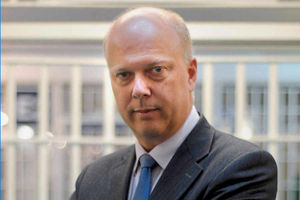Shropshire magistrate quits over 'crazy' fees
A Shropshire magistrate has resigned in protest at new rules that forces courts to impose extra fines for "petty crimes".
Richard Stilwell has spent 21 years working in the county's courts. But he walked out this week after he said he was compelled to order a man who stole goods worth £5.86 to pay fines and court costs totalling £385.
Mr Stilwell today told of his "utter sadness" after resigning as a magistrate at Telford Magistrates' Court.
He also attacked former Justice Secretary Chris Grayling for imposing charges he claims undermines the British judicial system.
Richard Stilwell:
"At my last sitting I sat on two cases. The first involved a theft of £5.86 and resulted in a total financial imposition of £385 for an unemployed young man. The second was an unemployed young man who put excessive toilet roll down a police-cell toilet and ended up with a total financial penalty of £410. These ridiculous amounts are down to the crazy new court charges."
The new criminal court charge, which came into effect in April, orders magistrates to charge people who plead guilty to minor offences at least £150.
But if a defendant denies the charge and ends up being found guilty, they can end up paying up to £1,000 in fines and costs.
The charges are not means tested, which Mr Stilwell says forces magistrates to issue punishments to those who have no hope of paying.
He said: "These ridiculous amounts are down to the crazy new court charges."
The 61-year-old claims the new charge will mean those facing conviction could now plead guilty simply to avoid the risk of higher costs to pay.
The new rules were brought in to ensure convicted adult offenders pay towards the cost of running the criminal justice system.
But Mr Stilwell, a Bridgnorth shop owner, claims it "goes against bedrock that justice must not only be done, but be seen to be done as well".
He is among more than 30 magistrates who have quit nationally on the issue.
"I can no longer abide by the judicial oath 'will do right to all manner of people after the laws and usages of this realm, without fear or favour, affection or ill will'."
Mr Stilwell has urged people to stand up to the changes that have imposed hefty costs for those found guilty of "petty crimes".
He said: "I feel sadness for the justice system and for democracy. I want people stand up to this and we can make change.
"At my last sitting I sat on two cases. The first involved a theft of £5.86 and resulted in a total financial imposition of £385 for an unemployed young man. The second was an unemployed young man who put excessive toilet roll down a police-cell toilet and ended up with a total financial penalty of £410. These ridiculous amounts are down to the crazy new court charges."

The range of penalties is levied on top of fines, compensation orders, victim surcharges or prosecution costs already imposed on those who plead guilty or are convicted at magistrates' or crown courts.
And some claim that many innocent people would be financially better off if they pleaded guilty as the charge ranges from £150 for anyone who pleads guilty to a summary offence at magistrates' court to a fine of £1,000 for those convicted after a trial of a more serious offence at magistrates' court.
Earlier this month one magistrate in South Tyneside walked out when he was forced to add the £150 tax and other fines when sentencing a homeless man who admitted stealing a 99p can of Red Bull.
And another magistrate told reporters that he "could not work one more day" after being forced to apply the levy on a man on benefits who had stolen meat for his family.
In the crown court, the charge ranges from £900 for a guilty plea up to £1,200 for conviction after trial. But the charges are not means tested.
Mr Stilwell said: "This charge was the final straw for me. I've not been happy with the way the justice system has been run under the current government and I cannot stand by and agree with this.
"These ridiculous amounts are down to the crazy new court charges and it will see those committing petty crimes faced with huge costs – and it is these people who have often not got the financial means to meet this demand.
"We were always told as magistrates to never impose a fine that could not be paid back within 12 months. I am afraid these new court charges are going to destroy ordinary people's conception of a fair British judicial system.
"Those facing any kind of court charge will now weigh up very carefully what a court appearance could cost them, irrespective of whether they believe they actually committed the alleged offence.
"I wish the magistracy well in an uncertain future and hope that some of the principles of the British judicial system can be upheld in the future. I have my doubts on this, though."
Mr Stilwell has also criticised a decision to close Shrewsbury Magistrates' Court, which would see people making costly trips to face justice in Telford.
He added: "Alleged offenders in Shropshire now travel vast distances regardless of their means or ability to get to court. As we know, a disproportionate number of offenders do not have appropriate financial means. What happened to local justice?"
The Magistrates Association, which represents most magistrates in England and Wales, has confirmed that a number of experienced magistrates have resigned in protest at the charge.
But the Ministry of Justice believes that the criminal courts charge reflects the cost of an offenders' case.
And payment by instalments, officials maintain, will ensure that money is collected.
An Ministry of Justice spokesman said: "It is right that convicted adult offenders who use our criminal courts should pay towards the cost of running them.
"The introduction of this charge makes it possible to recover some of the costs of the criminal courts from these offenders, therefore reducing the burden on taxpayers."
Mr Grayling said at the time of the imposition of the charge that it was right for offenders to pay towards the cost of holding court sessions.
He said: "We're on the side of people who work hard and want to get on, and that is why these reforms will make sure that those who commit crime pay their way and contribute towards the cost of their court cases."
"Under Labour it seemed that the message was 'crime does pay'.
"Sadly all too often on Labour's watch it seemed like criminals could just get away with it, leaving communities blighted and a trail of victims in their wake. We're turning that message on its head. Now it's the criminal who'll have to face the consequences of their crime – including the financial ones."



